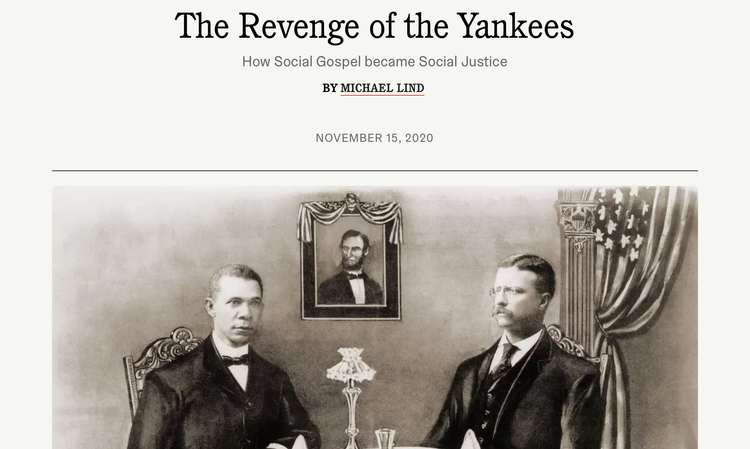
Michael Lind: “The Revenge of the Yankees”
By Steve Sailer
11/19/2020
In Tablet, neo-New Dealer Michael Lind offers an interesting theory of the FDR coalition and analogy to the Great Awokening as the new Establishment form of gentility:
The Revenge of the Yankees
How Social Gospel became Social Justice
BY
MICHAEL LIND
NOVEMBER 15, 2020Is America disintegrating into anarchy and civil war among races, religions, and regions? Is the country more divided than ever before? The answer is no. The social and economic divides among white Northerners and white Southerners, Blacks and whites, Catholics and Protestants and Jews were much more intense in 1920 than they are today in 2020. What has happened is that the formerly unified, mostly Northern mainline Protestant American establishment has — perhaps temporarily — broken down, allowing the actual diversity of interests and opinions in the United States to be expressed rather than suppressed. If the emerging woke national establishment has its way, however, that diversity of viewpoints and values will soon be suppressed once again, in favor of an intolerant and exclusive doctrine that greatly resembles the old-time Social Gospel from which it is derived.
With the exceptions of Grover Cleveland and Woodrow Wilson, every American president between 1861 and 1933 was a Republican mainline Protestant from the North or Midwest. The Republican Party, still the Lincoln coalition of Northern industrialists and Yankee Protestants, dominated Congress in the same era. Industry and finance were in the hands of a small number of Northeastern financiers, many of them old-stock Northeastern Protestants like J.P. Morgan. While there were some important Jewish financiers, Jews along with Catholics were kept out of many snobbish Wall Street firms until well after World War II.
The New Deal revolution of the 1930s is badly misunderstood, both politically and culturally, when it is treated as a left-wing rebellion against right-wing capitalism. Fundamentally it represented the partial overthrow of Yankee Protestant hegemony in American society by a coalition of outsiders, chiefly provincial Southern and Western whites and European-American immigrants in the North, many of them Catholic.
The Democratic Party that dominated the United States between the 1930s and the 1980s had a few Yankee progressive members, but it was essentially the old Jacksonian alliance of white Southerners and non-British “white ethnics” in the North. If Harry Truman is understood correctly as a cultural Southerner from Missouri, then with one exception every Democratic president between Roosevelt and Obama was a white Southerner — Truman, Johnson, Carter, and Clinton. The one exception was John F. Kennedy, from the other wing of the Jacksonian anti-Yankee alliance of Southerners and Irish Americans. Meanwhile, the Solid South combined with the seniority system ensured that Southerners, many of them segregationists, dominated Congress and the Senate throughout the New Deal era.
Most New Deal Democratic politicians were not anti-capitalist or opposed to industry. They often represented socially conservative local business elites who resented the fact that Northern bankers often would only finance infrastructure projects in the South and West that locked those regions into their assigned roles as resource colonies for factories in the Midwest and Northeast.
To break this neocolonial pattern of Northeastern economic domination, New Deal Democrats used federal state capitalism to industrialize and modernize the Southern and Western periphery, by means of rural electrification cooperatives, the Tennessee Valley Authority and other hydropower projects, defense production plants assigned to the South and West during World War II, and the interstate highway system (a favorite project of FDR which was only enacted under Eisenhower). In short, Southern and Western politicians and their Northern white ethnic allies who dominated the federal government in the New Deal era deployed federal state capitalism to do an end run around unsympathetic Yankee capitalists, not to advance toward socialism or social democracy.
The New Deal era also witnessed the downfall of the post-Civil War New England/Midwestern hegemony in American literature and culture. Following World War I, advanced intellectuals ridiculed the Puritan tradition in New England and its offshoot, the upper Midwest, home of Sinclair Lewis’ Babbitt and Sherwood Anderson’s Winesburg, Ohio. …
The postwar literary world underwent an ethnic succession, in which many white Southerners — including Willie Morris, Tom Wolfe, William Styron, Gore Vidal, and Truman Capote — together with Jewish writers and intellectuals like Saul Bellow, Philip Roth, and many others shouldered aside Northeastern WASP professors and novelists and purged the American literary canon of New Englanders like Longfellow, Whittier, and the Fireside Poets.
My impression is the Great Awokening is a sort of post-Protestant new gentility that worships blacks precisely because it’s so hard not to slip up and notice / mention ungenteel truths about blacks.
I think a lot of the key players in the Great Awokening are liberal Ashkenazi Jews. Their ancestors having undergone “The Ordeal of Civility” (as John Murray Cuddihy phrased it), they are now appalled by those who remind them of their ancestors, such as less genteel Jews like the Sephardics, Israelis, fundamentalists, ex-Soviets and so forth.
